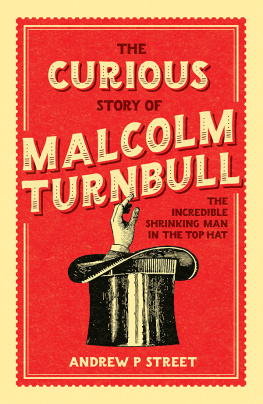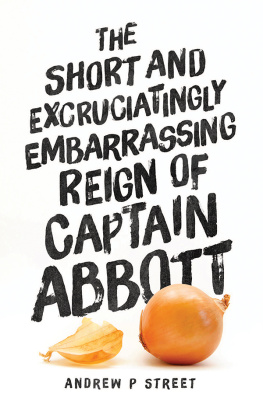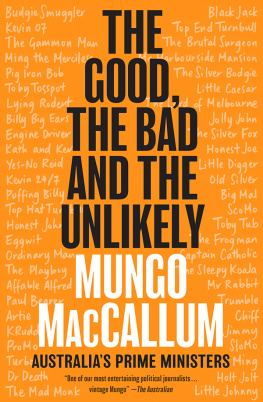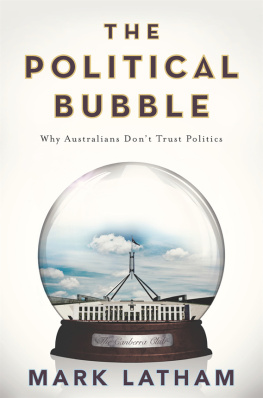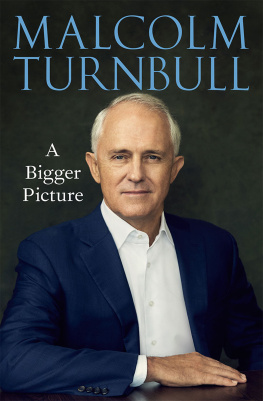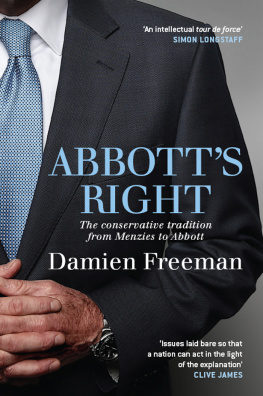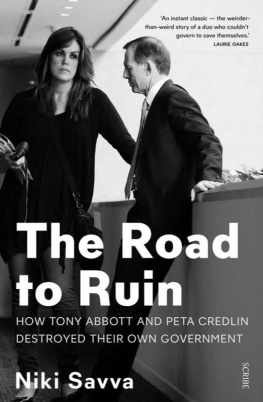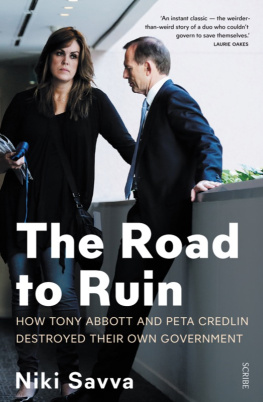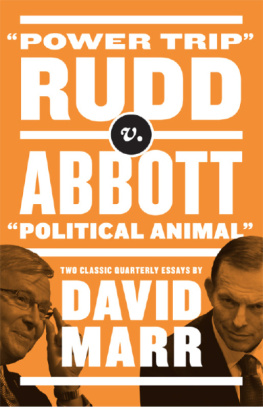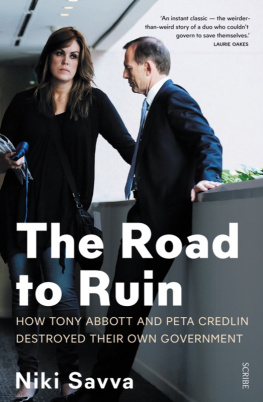DANIEL BOUD
Andrew P Street is an Adelaide-built, Sydney-based journalist, editor, columnist and failed indie rock star responsible for View from the Street in the digital edition of The Sydney Morning Herald. Over the last two decades hes been published internationally in Time Out, Rolling Stone, NME, The Guardian, GQ and Elle, as well as pretty much every newspaper, magazine and website in Australia with a freelance budget. This is his first book.
First published in 2015
Copyright Andrew P Street 2015
All rights reserved. No part of this book may be reproduced or transmitted in any form or by any means, electronic or mechanical, including photocopying, recording or by any information storage and retrieval system, without prior permission in writing from the publisher. The Australian Copyright Act 1968 (the Act) allows a maximum of one chapter or 10 per cent of this book, whichever is the greater, to be photocopied by any educational institution for its educational purposes provided that the educational institution (or body that administers it) has given a remuneration notice to the Copyright Agency (Australia) under the Act.
Allen & Unwin
83 Alexander Street
Crows Nest NSW 2065
Australia
Phone: (61 2) 8425 0100
Email:
Web: www.allenandunwin.com
Cataloguing-in-Publication details are available
from the National Library of Australia
www.trove.nla.gov.au
ISBN 978 1 76029 054 2
eISBN 978 1 92526 880 5
Cover design: Robert Polmear
CONTENTS
In which your humble narrator explains why he stowed away aboard this scurvy vessel in the first place.
Democracy is a term whose origins lie in two shorter words: the Greek demos, meaning citizen of the state, and the Old Norse word acraser, meaning full of cracks. This is why its universally understood as meaning rule by horribly broken people.
In that spirit, friends, welcome to a snarky treatise on Australian politics and the short, strange, and embarrassing rule of one Anthony John Abbott, the nations twenty-eighth, and arguably most foolish, prime minister.
Theres no way to sugar-coat it: the politics consumers of Australia have been through some infuriatingly silly times since 2013, and this book is an attempt to contextualise said times in the hope that future generations will learn not to let them happen again. Its possibly a vain hope, of course, since Australias not great with historynot least because so much of it is based on invasion, murder and bad decisions leading to often-bloody consequences.
Indeed, for a country whose national humour is deeply, fiercely sarcastic, Australias surprisingly bad with irony. Perhaps its because everything about the place reeks of the stuff.
Our national hero is an anti-authoritarian Irish bush-ranger who defied a corrupt regime of powerful commercial interests and an easily bought justice system to fight against the destructive influences of poverty and discrimination. Our nation-defining military operation was a doomed and bungled beach assault followed by slinking away under cover of darkness, on the orders of an imperial regime that regarded Australians as completely expendable.
And at every sporting event our leaden national anthem is blasted out to the world even as our immigration policies put the lie to the noble declaration trumpeted in the notorious second verse: For those whove come across the seas / Weve boundless plains to share. These are the boundless plains that were, as everyone around the world is acutely aware, stolen by a bunch of criminals and foreign interlopers lobbing in on boats. In 2015 such landings were illegal and immoral; in 1788 they represented the proud birth of our plucky nation. Even the overused phrase the lucky country, which has functioned as Australias unofficial motto since Donald Hornes book of the same name was published in 1964, means the exact opposite of what it appears to convey. Unlike the unambiguously bang-on title of the book youre holding now, Hornes was intended as a wry commentary on the nation, not a celebration of our indisputable good fortunea fact he made clear at the beginning of the final chapter:
Australia is a lucky country run mainly by second-rate people who share its luck. It lives on other peoples ideas, and, although its ordinary people are adaptable, most of its leaders (in all fields) so lack curiosity about the events that surround them that they are often taken by surprise.
And in that spirit, perhaps the Abbott government was the greatest possible manifestation of Hornes prescient vision.
Its a truism that Australian federal elections are never won, only lost; but never in Australias history has a government been elected on so strong a platform of not being the previous one. What makes this epoch extraordinary, then, is the haste with which the marriage of the Abbott government and the Australian people soured. And the responsibility for that fell at the feet of one man.
While governments have always been at the beck and call of the powerfulafter all, thats basically what powerful meansit was almost refreshing to see a government willing to perform with such brazen disregard for the common good. More specifically, never before has a leader so clearly outlined his priorities by demonstrating how little the common good came into the equation.
This book tells the tale of a government that came into office to begin what was predicted to be the beginning of a conservative epoch, not least because the Opposition was so divided and scattered, and yet proceeded to collapse under the weight of the exact same internecine squabbling and political opportunism that destroyed its opponents. Furthermore, it will depict the way that the Abbott government used a combination of zealotry, single-mindedness and sheer gall to transform near-universal national goodwill into widespread condemnation. In fact, this might yet be the story of how Australian politics has come to be changed forever.
Theres an upside, though: perhaps it took the predations of the Abbott government to teach Australia to give a shit about politics again.
Tony couldnt have done it alone, mind. He was aided and supported by his treasurer, the often-struggling Joe Hockey, and a front bench principally made up of ineffectual and superannuated MPs and senators chosen for loyalty rather than competence, and a back office with little interest in hearing dissenting opinion (or, for that matter, opinions at all), controlled by Abbotts chief of staff, the formidable Peta Credlin.
Looking into what at the time seemed a deeply optimistic crystal ball, I wrote a piece entitled Why an Abbott Victory Would Be Good for the website TheVine, published a few days before the federal election in September 2013. In that piece I made a few predictions regarding how things would shake out in the all-but-mathematically-certain event of the Coalition taking power:
We already know [Abbott] cant open his mouth without saying the exact wrong thing. We already know that hes terrible on policy, cant think on his feet and dodges responsibility. At the moment he can largely get away with blaming the government; once hes Prime Minister, thats not an option anymore. He will look like what he is: a man of narrow views and narrower knowledge woefully out of his depth.
And look at the Abbott front bench: its a vipers nest. Theyre not supporting Abbott because they think hes an inspiring leader, since hes demonstrated comprehensively that hes not: theyve backed him because the greatest strength they have had against Labor over the last 18 months has been in presenting a united front.
Once theyre in power this bunch of smart, ambitious and shrewd politicians are going to be a lot less forgiving of a leader whos an obvious and embarrassing liability. Hockey isnt going to fade back into the benches. Neither is [Malcolm] Turnbull. Neither is [Julie] Bishop. Neither is [Scott] Morrison. Those squabbles have been sublimated for the time being because they had a common enemy: Labor. Once in power, theyll have a different common enemy: each other.
Next page

